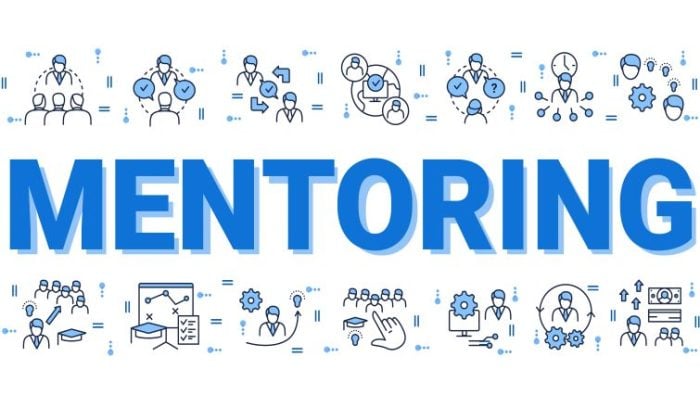How To Be A Strong Mentor
 Publié le 25 February 2022
Publié le 25 February 2022
With the positive impact that mentorship can have on career development, professionals at all levels should be encouraged to ask how to be a strong mentor and play an important role in the workplace.
A strong mentor is more than just a leader or a teacher. They help to create an open and supportive environment in the workplace, and provide the type of guidance that can prove invaluable throughout a professional career. For those asking how to be a strong mentor, there are a few important factors they should consider and put into practice.
Why Mentorship Is Important
Having a strong mentor is not just a nice bonus, but rather can play a vital role in shaping the next generation of professionals. A recent study shows that more than three-quarters of professionals believe that mentors play an important role, only 37% of these professionals actually have a mentor in the workplace. The desire for mentorship makes sense, given the current rapid pace of all types of businesses and how useful it would be to have someone to provide guidance in the workplace.
Having strong mentors is also a sign of a workplace built on collaboration, support and development. With the new popularity of remote and hybrid working arrangements, it is too easy for people to feel disconnected and separated from their coworkers. Having colleagues that they can turn to for support and mentorship will help ensure that a work team functions well together regardless of changing circumstances.
How To Be A Strong Mentor
- Lead by example
- Continue to learn
- Organize training
- Ask for feedback
- Avoid repeating mistakes
- Don’t micro-mentor
- Be open to adaptation
Lead By Example
“Do as I say, not as I do” is a pretty terrible philosophy, both in life and in work. Workplace mentors are also leaders, and must make every effort to lead by example. If you want a new hire to be a part of a supportive and collaborative team culture, you have to demonstrate that you make the effort to make this type of workplace culture a reality. If you can show that you consider yourself to be part of the workplace, and not above, it will show mentees that you are committed to the organization and they should be as well.
Continue To Learn
Mentoring is also teaching, and there is no point in teaching techniques and practices which are outdated and ineffective. Part of knowing how to be a mentor is making continuous learning a key part of your professional life. Instead of becoming mired in useless tradition, learning new techniques will make it far easier to adapt, change and grow.
By guiding your organization to keep up to date with market trends and consumer needs, you will play a strong role in its continued success and also foster a learning culture in the workplace. Mentees will understand that learning and evolving is not something to only be done as a last resort, but rather is a continuous process that will play a huge role in their professional life. By being a mentor who continues to learn and instill this proactiveness in others, you will help to ensure that they have long and successful careers.
Organize Training
An important aspect of mentorship is providing hands-on training and learning sessions with new hires and mentees. These training sessions should be organized and prepared beforehand. Strong mentors will take the time to prepare documents and other training materials, which can then be provided to trainees to complete at their own pace. Having a training plan and structure will make the processes more streamlined and efficient, as long as the different learning styles of mentees are taken into account.
Ask For Feedback
Mentoring is not a one-way street. It is not nearly as simple as providing instruction and guidance for a new hire, and then watching them go on with their career. Strong mentors always ask for feedback from their mentees because it is the only way to know if the guidance they are providing is in fact accurate and useful. Establishing a feedback-driven culture in the workplace creates a professional bond built on trust and honesty.
The best way for a mentor to demonstrate that they trust their mentees is to turn their feedback into actionable practices. When a mentee sees that their opinions result in real change in the workplace, they will have first-hand proof that their mentor considers them to be an important part of the workplace team and will be more likely to become fully engaged employees.
Avoid Repeating Mistakes
Hopefully mentors choose to provide mentorship to others because they had a strong mentor who helped them develop professionally. If you had a mentorship experience which you considered to be less than successful, it’s vital to avoid repeating these same mistakes. Take the time to review your own mentorship experience and decide what about the process worked for you and what can be improved.
Consider how the needs and expectations of people working in the sector have changed and evolved in order to keep up with market trends, and apply these same levels of adaptability to mentorship. Even if your mentorship experience worked for you, it is very unlikely that simply repeating it exactly years after the fact will have the same results for others.
Don’t Micro-Mentor
One of the most ineffective forms of leadership is micromanagement. This is when a manager or supervisor tries to have a high level of control over every aspect of how their employees complete tasks and perform their jobs. Over half of all employees have experienced micromanagement, even though it leads to poor results, unhappy employees and unimaginative work and should be avoided at all costs. Micro-mentors apply a similar harmful approach to the mentorship process.
The impulse to micro-mentor comes from an understandable thought process, one where professionals have considered how to be a strong mentor and think they have the only effective solution. What strong mentors have to remember is that each person is different and will grow and develop professionally in different ways. Even if you are mentoring a new hire to perform your previous job role, you cannot expect them to adjust to the job and perform it exactly as you did. Instead of trying to micro-mentor every step of the professional development process, you must leave room for people to experiment and try processes to determine what works best for them as you continue to provide guidance.
Be Open To Adaptation
The pace at which the business world moves has grown exponentially faster. Many people find themselves working in job roles that would have looked drastically different just a couple of years ago, let alone a decade. When considering how to be a strong mentor, you have to accept that being open to adaptation is one of the most important mindsets. By accepting the learning, growing and changing are not only beneficial, but also inevitable, it will be easier to help instill the same mindset in mentees. A strong mentor will develop the type of open perspective that will serve them as jobs and businesses continue to change.
Thinking of how to be a strong leader is only the first step. The role that strong mentors play in the workplace can’t be overstated. They provide guidance for new hires, create an environment dedicated to support and learning, and instill attitudes and mindsets that will continue to help people successfully adapt and evolve throughout their professional careers.







